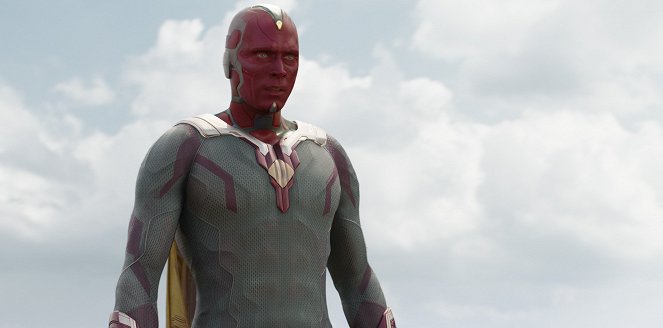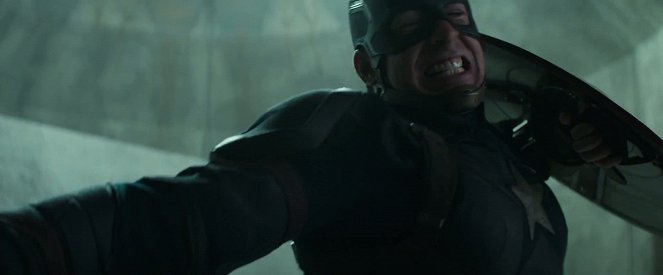Photographie:
Trent OpalochMusique:
Henry JackmanActeurs·trices:
Chris Evans, Robert Downey Jr., Scarlett Johansson, Sebastian Stan, Anthony Mackie, Don Cheadle, Jeremy Renner, Chadwick Boseman, Paul Bettany (plus)Résumés(1)
Steve Rogers est désormais à la tête des Avengers, dont la mission est de protéger l'humanité. A la suite d'une de leurs interventions qui a causé d'importants dégâts collatéraux, le gouvernement décide de mettre en place un organisme de commandement et de supervision. Cette nouvelle donne provoque une scission au sein de l'équipe : Steve Rogers reste attaché à sa liberté de s'engager sans ingérence gouvernementale, tandis que d'autres se rangent derrière Tony Stark, qui contre toute attente, décide de se soumettre au gouvernement... (Walt Disney Company France)
(plus)Vidéo (36)
Critiques (16)
Marvel filled the hero cloning device and then turned on the uniformity generator. When these heroes, profiled long ago, spend the first hour verbally tapping each other to find out how much they prefer diplomacy over muscle, you somehow end up buying it, even though we know their motives and have an inkling of how and why they make their choices. Yet the action at Leipzig airport perfectly defines what's wrong with the MCU. The protagonists, who have stood together until recently, are suddenly about to face a massive battle and... nothing. Where's the personal drama when they manage to tell each other they're still friends between their fists landing on each other? Every move is predictable, every action guessable. The Siberian anabasis also misses a second chance in the same vein. True, in the individual aspects - the partial action moments, though none of them reach the Winter Soldier's momentum, the Black Panther, the Bourne-esque feel of the first half - it is strong and proves that the Russo brothers got it right, but as a whole, it’s absolutely draining, unsurprising, and you forget about it in a few days. Given what the film earned, there’s no reason for them to change anything for years to come.
()
Where are the times when I approached every new superhero movie with humbleness and I respected Tobey Maguire as Spider-Man. Then I waited half a year for X-Men to appear and in between some B-rated superhero movies appeared here and there, like Daredevil and Elektra,that didn’t play at anything because they knew perfectly well what stories they were telling. However, modern time is different and movies based on comic books are experiencing a boom. The boom is so big that the producers let the Russo brothers spend so much money on a movie that combines something that was incompatible until recently; they offered the role of Spider-Man to a third actor and wrapped it all into a typical, wannabe funny and digitally advanced package that pretends to be very expensive and cool but unfortunately is also reflecting todayʼs time. In reality, it is a mix of nonsense that combines The Avengers, Spider-Man, Captain America, Ant-Man, and Iron Man and there is nothing good about it. I find rather sad what is perceived to be the pinnacle of cinematographic pop culture. A cheap combination of comic book heroes with uninteresting characters and a mediocre story.
()
I'll say right off the bat that I liked the second Captain America better, but fortunately the Russos carried a lot of things over from that into Civil War. The action is still just as gritty and full of clever moments, and there's plenty of room for the other heroes, both newcomers and those from the other films, to show off their abilities. When the action starts, fans of Cap, Iron Man, Ant-Man, Hawkeye and the newcomers will come into their own – Spidey and Black Pather are excellent. The problem, however, comes when the action stops. The Russos are still great at handling characters and defining their perspective on the whole situation in one sentence, making you understand why Black Widow doesn't go with Captain and why Scarlet Witch is on his side. But it's too much. There are simply too many heroes, so while the shorthand works, few get the space to impress. In the end, this is a film in which Tony Stark and Bucky are at the center of the action and the others are more or less extras. Everyone has a chance to make an impact, but if half of the supporting characters were cut out, it wouldn't matter at all. They don't hurt, they don't step over each other, but there's just no time to resolve the conflicts of these secondary characters in a way that makes one really care. On the other hand, even two sentences tossed off by Vision in a silly sweater are still more interesting than the ramblings of Batman and Superman discovering that their moms have the same name. The third Captain is good, but the thing we feared was a bit of a factor. The Marvel Universe has swelled so much that the even best filmmakers simply can't make a movie out of the pile of characters and motives in a way they all get adequate space in. And it's a bit of a shame. The solos suit this franchise better than the team-ups. On the other hand, if the team-ups look like Civil War, I'll always be happy to be there.
()
A new Marvel era begins with Civil War. Not only because the film introduces new players to the stage with unusual ease, but also because it definitely opens the door to a dimension left completely aside in the first, and partly also in the second Avengers. Civil War closes the gap between the "down-to-earth" series Daredevil and the escapist blockbusters, while at the same time showing DC and Warner quite indiscriminately what a careful character and story build-up is for. There may be cliché in the middle of the story, but Brühl, as a mysterious mover, is an unusually civil and believable (semi) villain. At the same time, Captain America is definitely finding his role as Captain of Inconsistency - a character so faithful to the original heroic idea of the comics that in the time of relativization, everything actually becomes a subversive element. His clash with Stark is much better motivated and, most importantly, much more meaningful than Batman v Superman. The intimate and unexpectedly impressive finale is an imaginary breakthrough. In this world, nothing will be as simple and clear as before. Marvel overwhelmingly won the battle with the competition and with itself. After Civil War, you may be wondering if you're more on the side of Team Captain America or Team Iron Man. But it's hard not to be on the side of Team Marvel. Who would have thought back in 2012?
()
This movie could just as well have been called Avengers 3 (if you forget about the Hulk and Thor). However, the misleading title is the least of its problems. Civil War is dragged down by the myriad characters between whom the brothers fail to ignite and sustain the same spark as Joss Whedon. With many of the actors, it is patently obvious that they are here only so that they can play a larger role in any of the future Marvel movies (WTF cameos from Marisa Tomei, Martin Freeman and William Hurt, each of which barely covers half a minute). The most important antagonism, nourished in each of their film encounters, i.e. the animosity between Stark and Rogers, is fully played out only at the end, albeit skilfully enough to make you at least hesitate for a moment about who to keep your fingers crossed for. The last act, when the various narrative formulas (teamwork, whodunit, political/espionage thriller) come together to form a relatively well-ordered whole, greatly improves the final impression, despite the significant idiocy of the villain’s reasoning (or why do things the easy way when you can base your plan on the assumption that a certain character will behave in a certain way after certain information has been revealed). Much more so than in the relationships between the superheroes, the brothers are sure-footed in the action scenes, which are satisfyingly varied and clearly constructed, and in the well-thought-out concealment and revelation of information (so something will still surprise you by the end of the movie, even if you’re familiar with the needlessly revealing trailer). On the other hand, the action scenes always last longer than is necessary and the most epic scene is inserted into the film solely as a reward for fans who have seen all of the previous movies from the Marvel Universe. After a while, it all becomes a tediously long superhero showreel (particularly Ant-Man and the new Spider-Man show off everything that they can do) that even the actors don’t take too seriously, as they apologise to their opponents for every hard blow just to be sure (only poor Rhodes ends up a little worse for wear than would have been appropriate for the overall concept of the scene). The main thing is that innocent civilians, whose existence the Avengers have finally taken into consideration, don’t die in the course of the scene. After the preceding films, this hint of humanity comes across as an insincere attempt to meet a demand that changes according to society’s mood. And Civil War is nothing more than an honest effort to fulfil that demand. Aside from the greater demands placed on viewers, who this time have to find their bearings among the motivations and goals of a truly LARGE number of characters, the Marvel Universe is enriched especially by the additional characters, but less so by unique sources of inspiration (and stylistic choices) and the unexpected organisation of the narrative (like Captain America: The Winter Soldier). 80%
()
Photos (256)
Photo © Walt Disney Studios Motion Pictures



Annonces